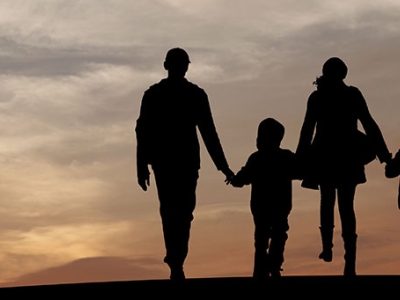
Can children overcome their parents’ sin?
A reflection on generational sin ... and grace.
At some point, every parent looks with pity at their child and thinks, ‘Poor thing. They get it from me’. Sometimes we’re thinking of some superficial attribute—our knobbly knees or uncontrollable cowlicks. But other times, we’re thinking of something more serious we’ve passed on, like asthma or anxiety.
We can also feel guilty about the things we pass on not by nature, but by nurture. Modern parents live in fear of emotionally ‘scarring’ their children through negligence or ignorance; we constantly seek out expert advice to help us get our parenting just perfect.
Sometimes the impact of our imperfect parenting is obvious: we see our children reflecting our worst habits right back at us. My heart sinks when I see our children snapping and growling at each other, saying ‘For goodness sake!’ or ‘How many times do I have to tell you?!’
Our children’s imperfections are a constant reminder that we have reproduced according to our kind. In a fallen world, human children inherit the genetic flaws and sinful tendencies of their imperfect human parents.
All parents leave a legacy of sin
For parents, the most confronting verses in the entire Bible may be Genesis 5:1–3:
When God created mankind, he made them in the likeness of God … When Adam had lived 130 years, he had a son in his own likeness, in his own image.
We often celebrate the fact that every person bears the image of God; but it is equally true that every child is also stamped with the image of their imperfect human parents. The first human couple did not begin to ‘be fruitful and multiply’ until after they had fallen into sin and been expelled from God’s Garden.
As we turn the pages of Genesis, we see that the shadow of one generation’s sin keeps falling across the next. For instance, Isaac had twin sons but favoured Esau over Jacob; this caused a serious and sustained rift in the family. Even though Jacob knew firsthand the pain of being the unfavoured son, he went on to replicate his father’s sin: he favoured the sons of his beloved wife, Rachel, which provoked his other sons to murderous envy.
In every family, there are seams of sin that run down through the generations. In some families, it’s a line of visible sins like marital unfaithfulness, violence or alcoholism; in others, it’s a streak of more subtle sins, like pride, greed or unforgiveness.
At some point, every parent looks in despair at their reflection and thinks, ‘I am just like my father/mother’.
Children can overcome their parents’ sin
But in the pages of the Bible, we also see that the cycle of family sin can be broken. Over the course of Jacob’s life, he eventually overcame the sins of his father, Isaac.
After years apart, Jacob sought reconciliation with his brother Esau—healing the rift that Isaac (and he himself) had caused: ‘Esau ran to meet Jacob and embraced him; he threw his arms around his neck and kissed him. And they wept’ (Genesis 33:4).
Jacob also overcame his tendency to show favouritism among his sons. He eventually agreed to ‘give up’ his favoured son in order to save the family: he allowed Benjamin to join his brothers on their second journey to Egypt for food (Genesis 43). By the end of his life, Jacob had learned to deal fairly with his sons, ‘giving each the blessing appropriate to him’, in contrast to what his own father had done (Genesis 49:28).
Every person faces the temptation to repeat the mistakes of their parents; but with God’s help, it is possible to choose a different path. No-one is simply a victim of their upbringing. At the time of Israel’s exile, King Hezekiah pleaded with Jacob’s descendants:
Do not be like your parents and your fellow Israelites, who were unfaithful to the Lord, the God of their ancestors … If you return to the Lord, then your fellow Israelites and your children will be shown compassion by their captors and will return to this land, for the Lord your God is gracious and compassionate. (2 Chronicles 30:7, 9)
When we make a break with the sins of our ancestors, it’s almost like beginning a new family line. A parent’s sin may impact their children deeply; but a parent’s faithfulness can set a new, positive course that will bless many future generations. It is only the living three to four generations who experience the direct consequences of their parents’ sin; by contrast, God shows his love ‘to a thousand generations of those who love me and keep my commandments’ (Exodus 20:6).
Whatever the sins of our ancestors, we can resolve to make a fresh start. But it’s no use pretending that it will be easy. Resisting the temptation to follow the same destructive path as our parents requires daily commitment. Our progress may be very slow and littered with setbacks; we may need professional help. In the end, it may be our children or grandchildren who eventually manage to succeed where we have fallen short of our ideals.
My husband and I are trying to start a ‘new line’ on two fronts. On one side, we are trying to overcome the impact of a divorce in the previous generation. Currently, we are the only couple (out of six) in the next generation that is still living together, and with our biological children. Every day, we have to work hard to keep it that way.
On the other side, we are trying to build a Christian family with Christian priorities and traditions, when one of us has never experienced one. This takes an exhausting amount of reflection and discussion, and a great deal of trial and error. (In fact, I ended up writing a whole book in an effort to work it all out!)
Parents can leave a legacy of grace
We cannot escape the fact that we have brought into this world children who bear the image of us, their imperfect human parents. And we know from our own lives that breaking free from a legacy of sin is hard work.
So we need to equip our children to fight against the sinful tendencies they have inherited from us and, ultimately, from our first parents, Adam and Eve.
First, we can introduce them to Jesus—God’s only perfect Son—who overcame the sin of Adam. Jesus faced the same temptations but did not succumb to them. On the cross, Jesus bore the sins of every generation and absorbed their consequences. Jesus was the promised ‘seed of the woman’ who, through his life, death and resurrection, crushed the serpent’s head (Genesis 3:15). Those who take shelter in Jesus are spiritually adopted into his godly line, sharing his inheritance by sheer grace:
For just as through the disobedience of the one man the many were made sinners, so also through the obedience of the one man the many will be made righteous. (Romans 5:19)
Second, when we introduce our children to Jesus, we are arming them with the powerful weapon of forgiveness. We can teach them not only to depend on God’s forgiveness for themselves, but also to extend it towards others, including their parents.
Thanks to Jesus, we can also introduce our children to God—the only perfect Father—who never falls short like their earthly parents do. Every time we find that our ‘perfect parenting’ is hampered by our human limitations—our sin, powerlessness and foolishness—we can point our children to God, their heavenly Father, who is infinitely perfect, sovereign and wise.
Finally, we can introduce our children to the Holy Spirit, who empowers us from within to overcome sin. God’s Spirit gives us the strength and motivation to put off the attitudes and behaviours we inherited from our ancestors, and to put on the attitudes and behaviours of our new family line.
In this fallen world, all of us receive a legacy of sin from our ancestors. Let’s be honest with our children about what they have inherited from us. But let’s also leave them a legacy of grace that can overcome it. Let’s show our children how to become children of God, the perfect Father, through Jesus, the perfect Son. And let’s show them how to depend on God’s Holy Spirit so that ‘just as we have borne the image of the earthly man, so shall we bear the image of the heavenly man’ (1 Corinthians 15:49).
This article originally appeared at The Gospel Coalition Australia.
---
Harriet Connor is the Content Editor for Growing Faith and the author of Families in God's Plan: 12 Foundational Bible Studies and Big Picture Parents: Ancient Wisdom for Modern Life (Wipf and Stock, 2017). She lives on the Central Coast of NSW with her husband and four sons.

Families in God's Plan
From beginning to end, our lives are profoundly shaped by our family ties to those who came before us and to those who will come after us. The world around us offers loud and ever-changing opinions about what a family is and what it is for. But it is only by listening to God—who designed the human family in the first place—that we can build a strong and secure foundation for family life.
For more articles from Growing Faith, subscribe to our monthly e-newsletter.
To hear about the latest books and resources from Youthworks Media, subscribe here.







